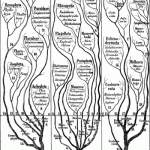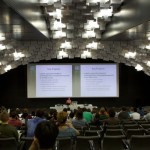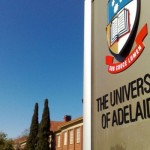Workshop on Modeling in Life Sciences organized by the Bolyai Institute of the University of Szeged on November 30, 2013, in Szeged, Hungary, in the framework of Mathematics of Planet Earth 2013 and the FuturICT.hu project. Information and preliminary program available at: http://www.math.u-szeged.hu/~knipl/mpe2013/ Poster presentations … Continue reading
Category Archives: Biology

Public Lecture presented by Professor Stephen Donnellan Some of the big questions in evolution of life on earth, such as how did life begin, why did sex evolve, how do species form, are starting to be unravelled by the availability of … Continue reading

Ever since the publication of Origin of the Species, biologists have aimed to uncover the evolutionary history of the species that inhabit (or once inhabited) the Earth – this project has come to be known as the Tree of Life. … Continue reading

Phylogenetics is concerned with the problem of reconstructing the past evolutionary history of organisms from molecular data, such as DNA, or morphological characters. There is ongoing interest in the further development of the mathematics that underlies computational phylogenetic methods. Hidden … Continue reading

APPLICATIONS ARE NOW OPEN The AMSI Summer School is an exciting opportunity for mathematical sciences students from around Australia to come together over the summer break and develop their skills and networks. Over the four weeks students take innovative courses … Continue reading

BioInfoSummer is a major annual bioinformatics educational and outreach event in Australia, bringing together in excess of 150 biologists, statisticians and bioinformatics professionals. Bioinformatics creates biological information and knowledge by the acquisition, archiving, integration, analysis and interpretation of biological data. … Continue reading
On November 12, 13 and 15, we are organizing the so-called Biomath days to which we invite students from the third grade of secondary school. On each of these days, the participating students will get in touch with the world … Continue reading
The Department of Mathematical Modelling, Statistics and Bioinformatics, Faculty of Bioscience Engineering, Ghent University, has seized the worldwide MPE initiative to illustrate the merits of clinging to a mathematical viewpoint within those domains of science that pursue deeper insights into … Continue reading
The Swedish National Committee for Mathematics arranges a free of charge public symposium in Stockholm, November 9th, 2013. The talks, given in Swedish, have titles that can be translated to:”So do numerical models for weather- and climate-forecasts work” , “Even living … Continue reading
Program: -Tomás Alarcón (Centre de Recerca Matematica, Barcelona, Spain): An Introduction to Stochastic Methods in Mathematical Biology -Mario Primicerio (Dipartimento di Matematica “Ulisse Dini”, Università degli Studi di Firenze, Italy): Mathematical Models for Social Changes and Criminology -Koby Rubinstein (Department … Continue reading
Program: – Jordi Bascompte (Integrative Ecology Group, Estación Biológica de Doñana, CSIC, Spain): The Mathematics of Biodiversity – Nicola Bellomo (Politecnico di Torino, Torino, Italy): Towars a Theory of Complex Living Beings – Joel Brown (UIC Biological Sciences, University of … Continue reading
The aim of this workshop is to bring experts in probability, information theory, and stochastic systems alongside experimental systems biologists to develop understanding of the principles underlying cellular signalling and decision-making, and to develop quantitative techniques to investigate those principles … Continue reading
Teach Networks to Teenagers
This is an article about outreach efforts to teach networks to students of age 13-16 in England. Supplementary teaching materials are available, too. Link to the abstract and article Download supplementary materials (.zip file)
Mathematics often is described as the language of science, particularly suited to speak to problems in physics, chemistry, engineering, and so on. Is mathematics also the language of life, suited to speak to problems in biology? Indeed, mathematics has a … Continue reading
This is part of a series of workshops organized by IMPA aiming at bringing together a multidisciplinary group of scientists to study problems in the biophysical sciences upon which mathematics may have an impact. This year’s main topics are: Inverse … Continue reading
MCRN Mathematics and Climate Annotated Reading Lists
MCRN Annotated reading lists: Each reading list is designed to provide an introductory guide to one area of climate science through its literature. They can be used for independent study, or as the foundation for upper division and graduate reading courses. … Continue reading
AMS-ASA-MAA-SIAM Math Awareness Month
April is Math Awareness Month in the US! Check out the essays, posters and related materials for 2013 and previous years‘ themes, including: 2013 – Mathematical and Sustainability 2011 – Unraveling Complex Systems 2009 – Mathematics and Climate 2008 – … Continue reading
The thematic program “Mathematical Biology” will be held in Lyon from March 4th to June 14th, 2013. The main topics to be addressed in this program are: cell biology, population dynamics, quantitative modeling for drug development, systems biology, and evolutionary … Continue reading
The main topics to be highlighted during the workshop are mathematical models for evolutionary biology (deterministic models and stochastic processes) adaptive dynamics modeling of invasive species Recent progresses have been made in the modeling of biological invasions and evolution, from … Continue reading
The workshop will include plenary lectures by leading researchers in tumor-immune system dynamics, parallel sessions of contributed/invited talks by senior and junior scientists, a poster session for graduate students, and a panel discussion on how to foster and sustain international collaborations in this highly multidisciplinary field of cancer immunology. Continue reading